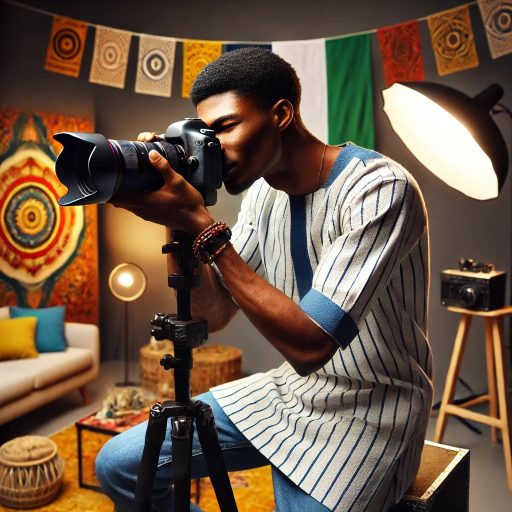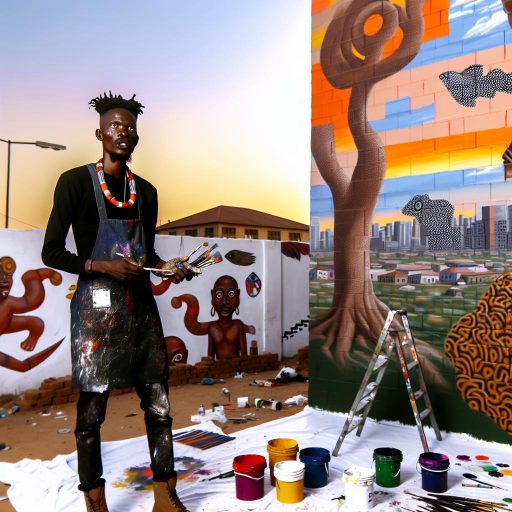Introduction to the Role of Creative Directors in Advertising
Creative directors play a vital role in the advertising sector.
They lead the creative vision for campaigns.
This leadership helps to shape brand messaging.
Moreover, they manage creative teams effectively.
Collaboration among team members fosters innovation.
In Nigeria, the advertising landscape is evolving rapidly.
Creative directors must adapt to changing consumer preferences.
They utilize market insights to drive creativity.
Furthermore, they establish a unique brand identity.
This identity resonates with target audiences.
Creative directors also oversee project execution.
They ensure that creative concepts align with client goals.
To achieve success, they focus on timely delivery.
In addition, they work closely with clients and stakeholders.
This collaboration enhances the creative process.
Creative directors encourage risk-taking in their teams.
Taking risks often leads to groundbreaking ideas.
Embracing creativity can increase brand visibility.
Furthermore, creative directors are responsible for quality control.
Their attention to detail ensures consistent branding.
Overall, they play a crucial role in brand storytelling.
Effective storytelling captivates audiences and drives engagement.
Ultimately, creative directors impact the success of campaigns.
Therefore, their contributions are essential in Nigeria’s advertising sector.
The Evolution of Advertising in Nigeria and the Influence of Creative Directors
Historical Overview
Advertising in Nigeria has undergone significant transformation over the decades.
Initially, it focused on promoting local goods through simple posters and word-of-mouth.
As technology progressed, advertising expanded its reach beyond traditional methods.
The introduction of television changed the advertising landscape dramatically.
Brands began to recognize the power of visual storytelling in capturing consumer attention.
The Rise of Modern Advertising
By the early 2000s, Nigeria witnessed a surge in advertising agencies.
These agencies began to employ innovative techniques and strategies effectively.
Notably, they started integrating digital platforms into their campaigns.
This shift allowed for greater audience engagement and broader market reach.
The Role of Creative Directors
Creative directors have become instrumental in shaping advertising narratives.
They balance creativity with strategic objectives to appeal to target audiences.
Their leadership inspires teams to develop compelling campaigns.
Creative directors also stay updated with global trends and local cultures.
This knowledge enables them to craft relevant and relatable messages.
Impact on Consumer Behavior
The work of creative directors influences how consumers perceive brands.
Effective campaigns build strong emotional connections with audiences.
Additionally, they create memorable experiences that resonate long after the campaign ends.
Thus, consumers are more likely to choose brands they connect with emotionally.
Future Prospects
As advertising continues to evolve, the role of creative directors remains vital.
They will play a significant part in integrating artificial intelligence into advertising processes.
Moreover, sustainability will likely become a central theme in future campaigns.
Creative directors must adapt to these changes to remain effective leaders.
Ultimately, their vision will shape the future of advertising in Nigeria.
Key Responsibilities of Creative Directors in an Advertising Agency
Strategic Vision Development
Creative directors define the overall creative vision for advertising campaigns.
They align this vision with the agency’s goals and client expectations.
This role involves brainstorming and conceptualizing innovative marketing strategies.
Furthermore, they ensure consistency across various media platforms.
Team Leadership and Collaboration
Creative directors lead and inspire creative teams in the agency.
They encourage collaboration among designers, copywriters, and marketing professionals.
This leadership promotes a dynamic and creative work environment.
Additionally, they provide guidance and constructive feedback on projects.
Client Interaction and Relationship Building
Building strong relationships with clients is crucial for creative directors.
They regularly communicate with clients to understand their needs and objectives.
This interaction helps in developing tailored advertising solutions.
Moreover, they present concepts and ideas effectively to clients.
Quality Control and Review
Creative directors oversee the quality of creative outputs in the agency.
They review designs and copy before final submission to clients.
This ensures that all work meets high standards and aligns with the vision.
Additionally, they address any issues or revisions required during the process.
Market Trend Analysis
Staying updated on industry trends is essential for creative directors.
They analyze market movements and consumer behaviors to inform strategies.
This knowledge helps in creating relevant and impactful advertising content.
Furthermore, they leverage insights to stay ahead of competitors.
Explore Further: Building a Creative Career as an Interior Designer in Nigeria
Creative Direction vs. Art Direction
Defining Creative Direction
Creative direction oversees the overall vision of advertising campaigns.
It involves strategy, storytelling, and the emotional tone of the brand.
Creative directors guide teams to ensure a cohesive message.
They work closely with clients to align brand values with creative output.
Understanding Art Direction
Art direction focuses on the visual and aesthetic elements of a project.
It involves the design and layout of advertising materials.
Art directors select color schemes, fonts, and imagery.
Their goal is to create a visually compelling presentation.
Key Differences Between Creative and Art Direction
Creative direction is broader than art direction.
It encompasses the entire advertising strategy and conceptualization.
In contrast, art direction zeroes in on visuals and aesthetics.
While creative directors articulate the brand’s message, art directors execute it visually.
Collaboration in the Advertising Sector
Creative and art directors must collaborate for successful campaigns.
They must communicate effectively throughout the project lifecycle.
Creative directors provide insights that shape art direction.
Art directors translate those insights into captivating visuals.
Ultimately, their partnership enhances the overall impact of advertising efforts.
You Might Also Like: How to Excel as a Fashion Designer in Nigeria’s Growing Market
Skills and Qualifications Required for Successful Creative Directors in Nigeria
Creative Vision and Innovation
Creative directors must possess a strong creative vision.
Publish Your Professional Profile, Business or Brand
Showcase your expertise, gain trust, and boost visibility instantly on Professions.ng.
Publish NowThis vision drives the conceptual development of campaigns.
They should also demonstrate innovative thinking in their approaches.
Furthermore, adaptability to market trends is essential.
Technical Skills in Design and Production
A solid foundation in graphic design software is vital.
Familiarity with tools like Adobe Creative Suite enhances their skill set.
Understanding production processes plays a crucial role.
They must collaborate with teams to achieve high-quality outputs.
Strong Leadership and Communication Abilities
Effective leadership is crucial for guiding creative teams.
Creative directors should inspire and motivate their staff.
Moreover, strong communication skills foster collaboration.
This includes articulating ideas clearly to clients and team members.
Strategic Thinking and Project Management
Strategic thinking helps align creative work with business goals.
Creative directors must oversee projects from conception to completion.
They must manage timelines and budgets effectively.
Utilizing project management tools can aid their efficiency.
Industry Knowledge and Cultural Awareness
In-depth knowledge of the advertising industry is essential.
Creative directors must stay updated on emerging trends.
Cultural awareness enhances their ability to connect with diverse audiences.
This understanding informs more effective campaign strategies.
Educational Background
A degree in a relevant field can provide foundational knowledge.
Popular disciplines include advertising, marketing, or graphic design.
Additionally, pursuing further education or certifications is beneficial.
Such qualifications boost credibility in a competitive market.
Delve into the Subject: How to Build a Career as a Creative Graphic Designer in Nigeria

Successful Advertising Campaigns in Nigeria
The Power of Storytelling
One of the most powerful advertising campaigns in Nigeria was led by Amaka Nnaji.
She directed the “We are Nigerians” campaign for Sunlight Detergent.
This campaign centered on storytelling to connect with local consumers.
It focused on everyday life and the resilience of the Nigerian spirit.
Consequently, the campaign resonated deeply with its audience.
As a result, sales increased by over 30% within six months.
Innovative Use of Technology
The “Keep Going” campaign for MTN was a technological marvel.
Creative director Tunde Adetunji utilized augmented reality features.
This approach captivated a younger demographic.
Engaging video content was shared widely on social media platforms.
Ultimately, the campaign enhanced brand loyalty and visibility.
Emphasizing Cultural Heritage
Cultural resonance played a key role in the “Nigerian Food Basket” campaign for Coca-Cola.
Directed by Ify Ogbonna, it celebrated diverse Nigerian cuisines.
The ads featured local chefs and home cooks showcasing traditional dishes.
This connection to cultural heritage fostered a sense of pride among viewers.
Subsequently, the campaign generated a buzz across various media channels.
Sales rose significantly as consumers felt a personal connection to the brand.
Cause-Driven Campaigns
One impactful initiative was the campaign by Diageo for Guinness.
Creative director Uche Obi focused on social responsibility themes.
The campaign tackled issues like gender equality and empowerment.
Guinness collaborated with local NGOs to amplify their message.
This strategy contributed to a positive brand image and community impact.
Furthermore, it attracted a new consumer base that values corporate social responsibility.
Uncover the Details: Top Art and Design Careers in Nigeria for Creative Minds
Challenges Faced by Creative Directors in the Nigerian Advertising Sector
Market Saturation
The Nigerian advertising market experiences intense competition.
This saturation often dilutes creative originality.
Additionally, brands struggle to stand out in the crowd.
With numerous agencies, distinguishing a brand is challenging.
Creative directors must think outside the box to capture attention.
Limited Budgets
Many advertisers face budget constraints in Nigeria.
These limits hinder the execution of innovative campaigns.
Creative directors often have to work with minimal resources.
This situation demands higher creativity within tight financial boundaries.
Moreover, low budgets can compromise campaign quality.
Consumer Expectations
Nigerian consumers are increasingly discerning.
They demand authentic and relatable content.
Creative directors must understand local culture deeply.
Furthermore, they need to create messages that resonate well.
Meeting diverse consumer expectations is a significant challenge.
Technological Advancements
Keeping up with technological changes is crucial.
New platforms and tools require continuous learning.
Creative directors must adapt to shifts in media consumption.
Moreover, staying updated with trends like social media is essential.
This fast-paced environment can be overwhelming.
Collaboration with Clients
Effective communication with clients is vital in advertising.
Misunderstandings can lead to project delays and revisions.
Creative directors often balance client visions with creative goals.
Therefore, building strong relationships is essential.
Client feedback can sometimes be contradictory or unclear.
Regulatory Constraints
Nigerian advertising has strict regulatory guidelines.
Creative directors must ensure compliance without stifling creativity.
Adhering to these regulations while being innovative is challenging.
Moreover, navigating bureaucracy can slow down campaign processes.
Understanding both creative and legal aspects is essential.
The Future of Creative Direction in Nigeria’s Rapidly Changing Advertising Landscape
Emerging Trends in Advertising
Nigeria’s advertising sector is witnessing rapid transformations.
Digital innovation plays a crucial role in this shift.
As a result, creative directors must adapt to new technologies.
Moreover, they must understand changing consumer behaviors.
This dynamic landscape emphasizes the importance of flexibility.
The Role of Social Media
Social media platforms are reshaping advertising strategies.
Creatives leverage these platforms for targeted campaigns.
Therefore, understanding social media analytics is vital.
Furthermore, staying updated on trends improves audience engagement.
Publish Your Professional Profile, Business or Brand
Showcase your expertise, gain trust, and boost visibility instantly on Professions.ng.
Publish NowCollaboration with Tech Startups
Collaboration is essential for fostering innovation.
Creative directors increasingly partner with tech startups.
This collaboration enhances campaign effectiveness.
Additionally, it provides access to cutting-edge tools.
Emphasizing Local Culture
Creativity rooted in local culture resonates well with audiences.
Creative directors should celebrate Nigeria’s diverse heritage.
This approach fosters brand loyalty among consumers.
Consequently, local narratives strengthen emotional connections.
Future Skill Requirements
The skills landscape for creative directors is evolving rapidly.
Creatives must possess a blend of artistic and analytical skills.
Data analysis will become increasingly important for strategizing.
Moreover, proficiency in digital tools will also be crucial.
Continued learning will be essential for career growth.
The Vibrant Advertising Landscape in Nigeria
The evolving advertising landscape in Nigeria remains vibrant.
Creative directors have a pivotal role in shaping its future.
With adaptability and innovation, they can thrive.
Additional Resources
Martin Okonkwo – Creative Professional – Freelance | LinkedIn




